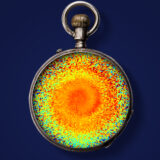Gaia detects a shake in the Milky Way
Image: The spiral shape of fig 1c of our article appears inside an old watch symbolising the fact that these data has allowed us to date back the perturbation that shook the Milky Way disk. This figure shows how from the new obtained Gaia data we can know more about the past of the Galaxy. Credit: Edmon de Haro/iStock. Researchers of the UB and the University of Groningen lead one of the first big discoveries from the Gaia Mission, published in Nature A team led by researchers from the Institute of Cosmos Sciences of the University of Barcelona (ICCUB, UB-IEEC) and the...
read moreGaia DR2 bulk catalogue available in FAPEC format
The Gaia group at the Universitat de Barcelona (IEEC – ICCUB), in cooperation with DAPCOM Data Services S.L. (a technological spin-off company of the UPC and the UB), has published an alternative copy of the bulk data files from Gaia DR2 – the second data release from Gaia. Gaia DR2 was published on 25 April 2018. Besides the on-line catalogue, bulk CSV files were also made available for download – an interesting option for exhaustive analyses. Such files are officially offered in “csv.gz” format, that is, compressed with the widely known gzip compressor. On 6...
read moreGaia’s snapshot of another galaxy (ESA, 20 April 2017)
Gaia’s snapshot of another galaxy Link: http://sci.esa.int/gaia/59023-gaia-s-snapshot-of-another-galaxy/ While compiling an unprecedented census of one billion stars in our Galaxy, ESA’s Gaia mission is also surveying stars beyond our Milky Way. A new image of M33, also known as the Triangulum galaxy, shows tens of thousands of stars detected by Gaia, including a small stellar census in its star-forming region NGC 604. This is a striking example of the mission’s potential to detect and characterise stars in nearby galaxies. Gaia’s view of the M33 galaxy. Credit:...
read moreFinal GENIUS meeting in Brussels (19 April 2017)
Final GENIUS meeting in Brussels Last April 19 the final review meeting of GENIUS (http://genius-euproject.eu/) took place at the Research Executive Agency (EC) in Brussels. After explaining all the achievements and success of the project, designed to boost the impact of Gaia, the team formed by 13 nodes in 9 countries received warm congratulations from the reviewer and the Project Officer. “GENIUS has opened the box of Gaia” in the words of the reviewer.
read moreDones amb passió per les estrelles (Diari Ara, 11 Feb 2017)
Dones amb passió per les estrelles Les dones han fet grans aportacions a l’astronomia, sovint a l’ombra. Avui, tot i que la seva feina és reconeguda, aquesta encara és una de les disciplines amb menys investigadores Les dones computadores de Harvard. / HARVARD-SMITHSONIAN CENTER FOR ASTROPHYSICS Actualment, un 39% de les persones que fan recerca a Catalunya són dones. En algunes àrees, fins i tot són menys. És el cas de l’astronomia, en què el percentatge d’astrònomes no arriba al 30%, explica Cesca Figueras, física i investigadora de l’Institut de Ciències del Cosmos de la UB (ICCUB) i de...
read moreEl Consorci pel Processament i Anàlisi de Dades (DPAC) es reuneix a Sitges per debatre el Data Release 2 de la missió Gaia
El Consorci pel Processament i Anàlisi de Dades (DPAC) es reuneix a Sitges per debatre el Data Release 2 de la missió Gaia Uns 200 astrònoms, científics, enginyers i programadors del Consorci pel Processament i Anàlisi de Dades (DPAC) de la missió Gaia es van reunir a Sitges del 23 al 27 de Gener de 2017. Durant aquests dies, els experts de les diverses unitats i centres van tenir la oportunitat de posar en comú els seus avanços en la missió i els resultats obtinguts fins ara, incloent aquells obtinguts a partir de la primera publicació de les dades feta el passat Setembre. Així...
read more








